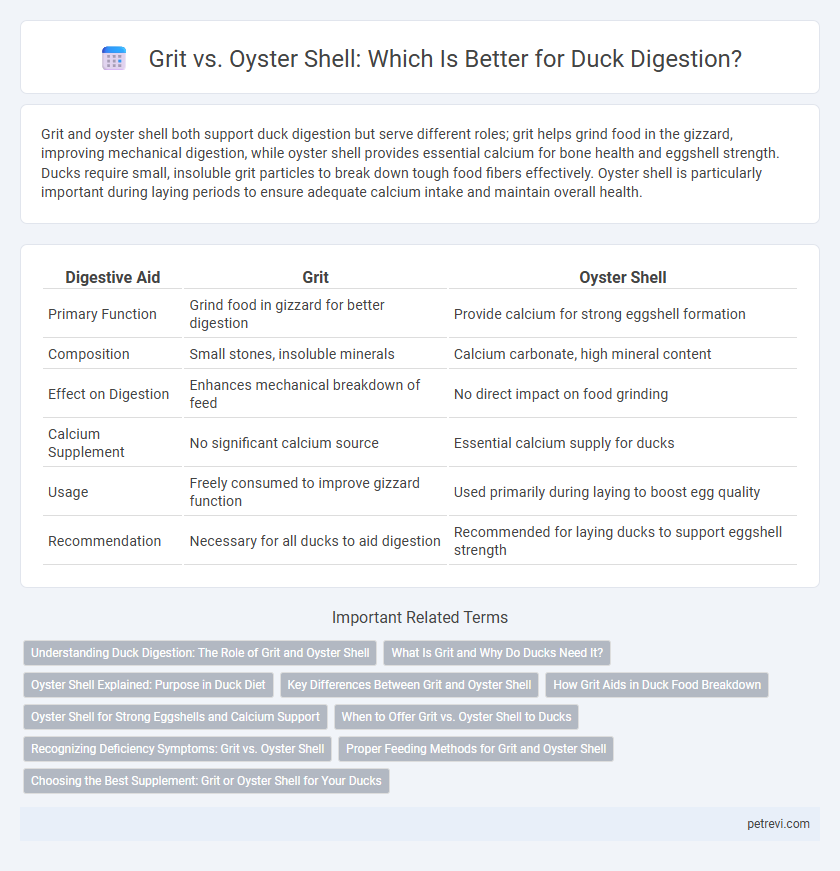Grit and oyster shell both support duck digestion but serve different roles; grit helps grind food in the gizzard, improving mechanical digestion, while oyster shell provides essential calcium for bone health and eggshell strength. Ducks require small, insoluble grit particles to break down tough food fibers effectively. Oyster shell is particularly important during laying periods to ensure adequate calcium intake and maintain overall health.
Table of Comparison
| Digestive Aid | Grit | Oyster Shell |
|---|---|---|
| Primary Function | Grind food in gizzard for better digestion | Provide calcium for strong eggshell formation |
| Composition | Small stones, insoluble minerals | Calcium carbonate, high mineral content |
| Effect on Digestion | Enhances mechanical breakdown of feed | No direct impact on food grinding |
| Calcium Supplement | No significant calcium source | Essential calcium supply for ducks |
| Usage | Freely consumed to improve gizzard function | Used primarily during laying to boost egg quality |
| Recommendation | Necessary for all ducks to aid digestion | Recommended for laying ducks to support eggshell strength |
Understanding Duck Digestion: The Role of Grit and Oyster Shell
Grit and oyster shell play crucial roles in duck digestion by aiding the mechanical breakdown and calcium absorption necessary for healthy metabolism. Grit, consisting of small stones or sand, grinds food in the gizzard, enhancing nutrient extraction, while oyster shell provides a vital calcium source that strengthens eggshell formation. Understanding the distinct functions of grit and oyster shell helps optimize duck diet formulation for improved digestive efficiency and overall health.
What Is Grit and Why Do Ducks Need It?
Grit consists of small, coarse particles like sand or crushed stone that ducks consume to help grind and break down food in their gizzards, facilitating efficient digestion. Unlike oyster shells, which provide essential calcium for eggshell formation, grit is crucial for mechanical digestion, especially when ducks eat whole grains or fibrous plant material. Providing access to clean, appropriately sized grit improves nutrient absorption and supports overall digestive health in ducks.
Oyster Shell Explained: Purpose in Duck Diet
Oyster shell in a duck's diet primarily provides a rich source of calcium, essential for strong eggshell formation and overall bone health. Unlike grit, which aids mechanical digestion by grinding food in the gizzard, oyster shell dissolves slowly to supply continuous calcium release. Incorporating oyster shell supports reproductive efficiency and enhances nutrient absorption by maintaining proper mineral balance in ducks.
Key Differences Between Grit and Oyster Shell
Grit consists of small, insoluble stones that aid ducks in mechanically breaking down grains and other food in their gizzards, enhancing digestion effectiveness. Oyster shell supplies soluble calcium, essential for strong eggshell formation and overall bone health in laying ducks but does not contribute to mechanical digestion. Both supplements serve distinct roles: grit supports physical digestion while oyster shell provides vital minerals, making their combined use beneficial for optimal duck health.
How Grit Aids in Duck Food Breakdown
Grit consists of small, hard particles like sand or crushed stone that ducks ingest to help mechanically break down food in their gizzards, enhancing nutrient absorption. Unlike oyster shells, which mainly provide calcium to strengthen eggshells, grit physically grinds tough food items, aiding digestion and preventing digestive issues. Providing ducks with access to quality grit supports efficient digestion and overall health by enabling effective food breakdown.
Oyster Shell for Strong Eggshells and Calcium Support
Oyster shell provides a rich, bioavailable source of calcium essential for strong eggshell formation in ducks, improving shell thickness and reducing breakage. Unlike grit, which aids mechanical digestion, oyster shell specifically supports calcium metabolism critical for laying ducks. Regular supplementation with oyster shell enhances eggshell quality, contributing to overall reproductive health and productivity.
When to Offer Grit vs. Oyster Shell to Ducks
Offer grit to ducks primarily when they consume whole grains, seeds, or forage outdoors, as grit aids in grinding food within their gizzards for better digestion. Oyster shell should be provided when ducks need additional calcium, especially during laying periods to support eggshell formation. Grit supports mechanical digestion, while oyster shell supplies essential minerals for bone strength and egg quality.
Recognizing Deficiency Symptoms: Grit vs. Oyster Shell
Grit aids in grinding food within the duck's gizzard, preventing digestive blockages, while oyster shell primarily supplies calcium essential for eggshell formation. Ducks with a grit deficiency may show signs of poor digestion, such as weight loss and undigested food in droppings, whereas calcium deficiency from insufficient oyster shell leads to weak eggshells and reduced laying. Recognizing these distinct symptoms is crucial for adjusting dietary supplements to maintain optimal duck health and productivity.
Proper Feeding Methods for Grit and Oyster Shell
Grit is essential for ducks to grind and digest fibrous plant material, while oyster shell provides a vital source of calcium needed for eggshell formation and bone health. Proper feeding methods include offering grit free-choice to allow natural selection based on dietary needs, and supplying oyster shell separately to prevent overconsumption, ensuring balanced nutrition. Both should be clean, particulate-sized appropriately for ducks, and replenished regularly to maintain optimal digestive function and reproductive performance.
Choosing the Best Supplement: Grit or Oyster Shell for Your Ducks
Grit and oyster shell serve distinct roles in duck digestion, with grit aiding in grinding food within the gizzard while oyster shell provides essential calcium for eggshell formation. Ducks require insoluble grit like granite or flint to efficiently process grains and plant matter, enhancing nutrient absorption. Oyster shell should be offered separately as a calcium supplement, especially for laying ducks, to maintain strong eggshell quality without interfering with the mechanical digestion provided by grit.
Grit vs Oyster shell for Duck digestion Infographic

 petrevi.com
petrevi.com